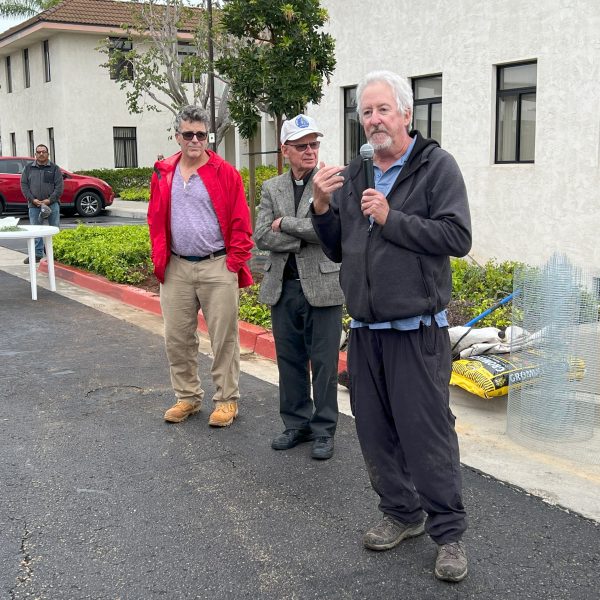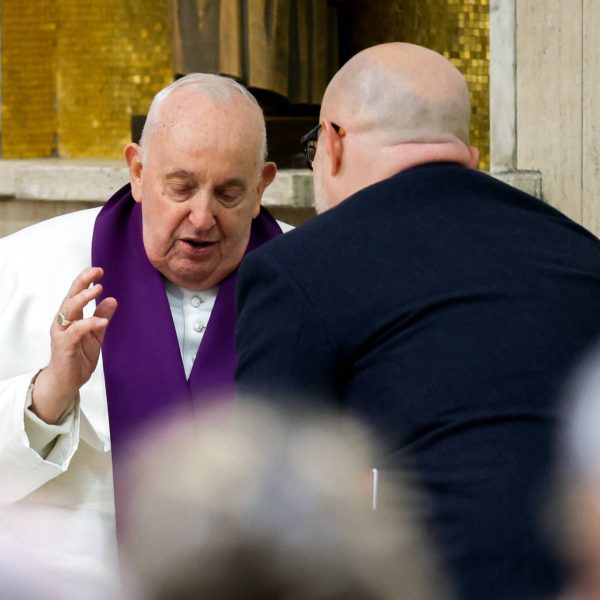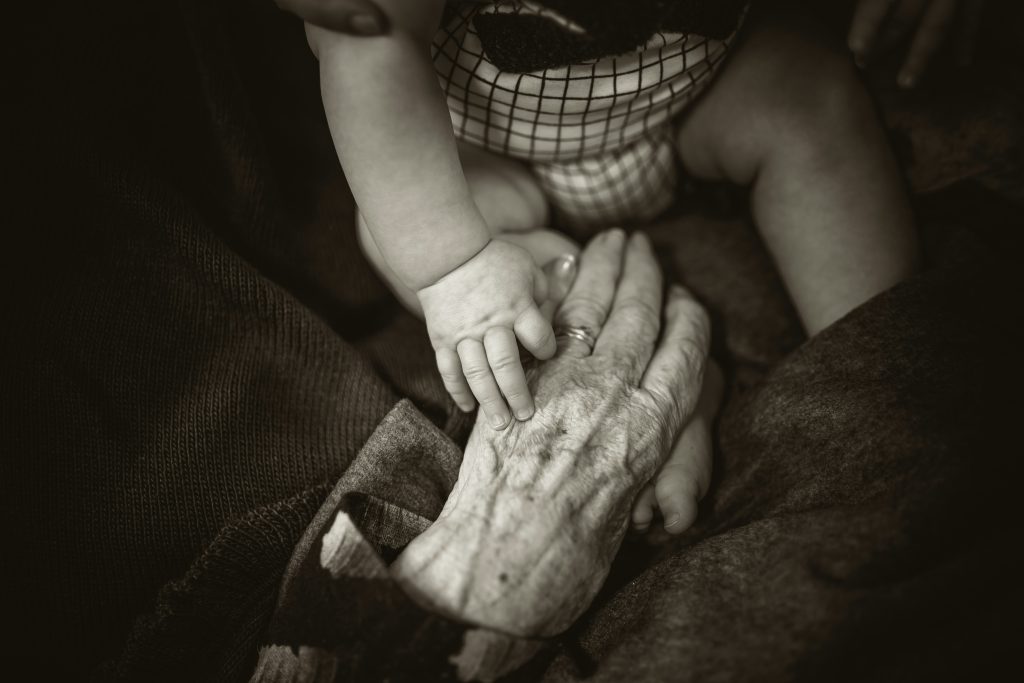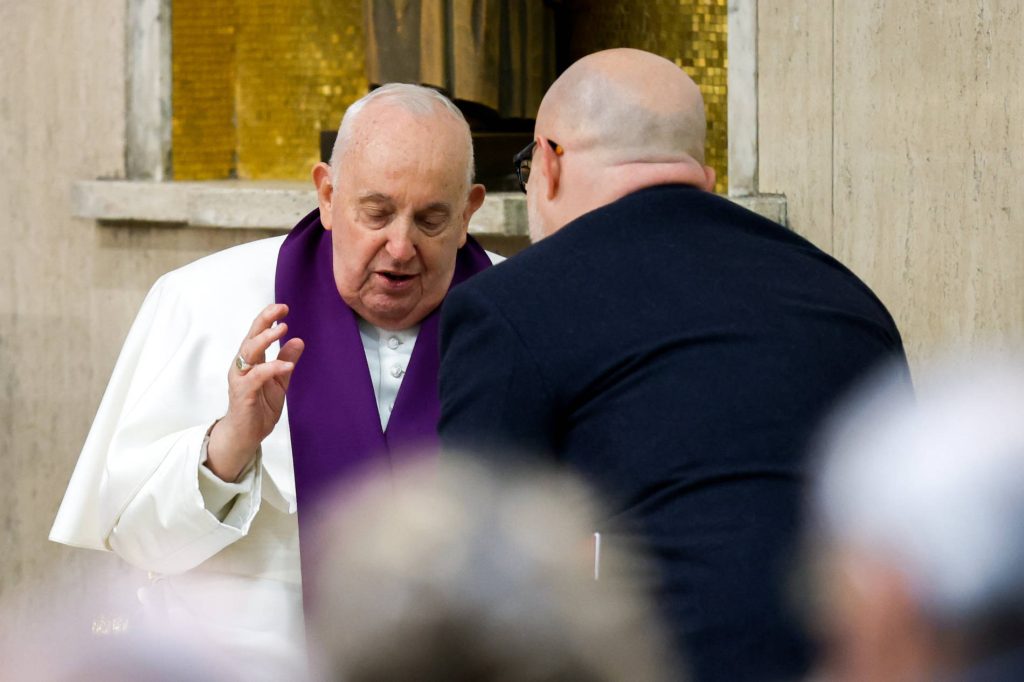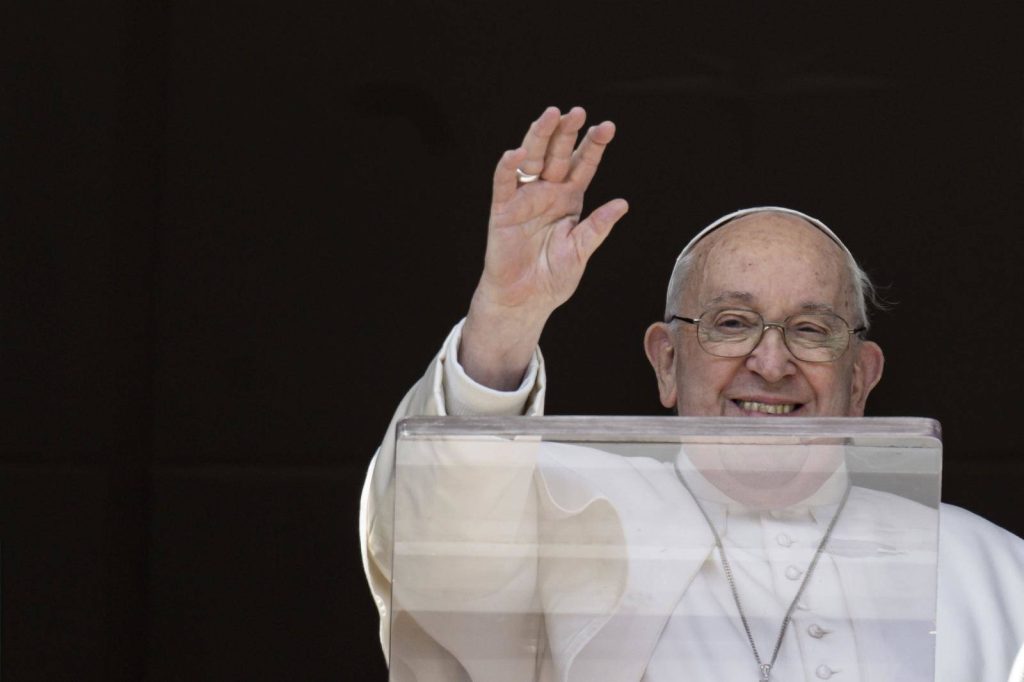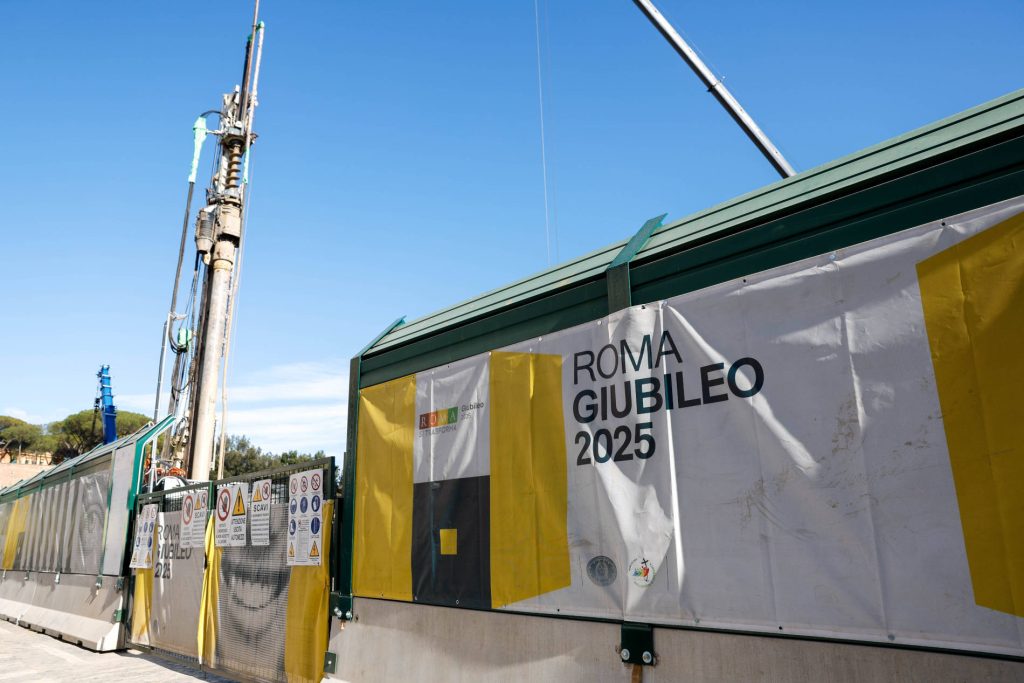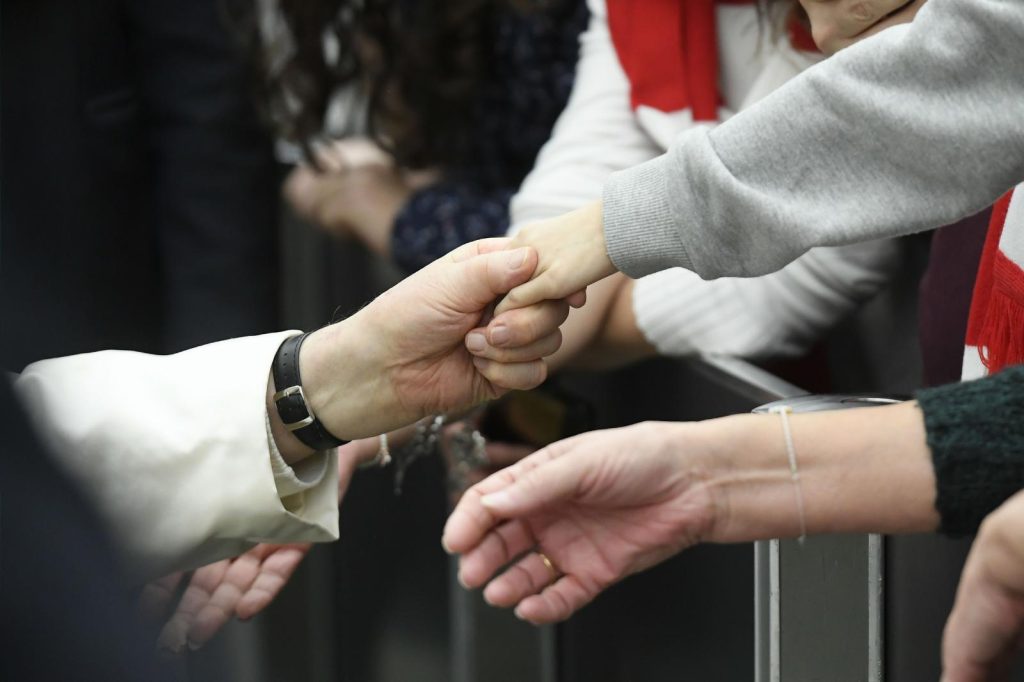ROME – Pope Francis elevated San Diego Bishop Robert W. McElroy and 19 others to the College of Cardinals on Aug. 27 at St. Peter’s Basilica.
Cardinal McElroy becomes the first cardinal ever to lead the San Diego Diocese, where he will continue to serve. On Saturday, he was the only church leader from North America to be elevated to cardinal.
The Pope presided over the hour-long ceremony, known as a consistory, in the packed basilica amid steamy summer heat.
One by one, each cardinal-designate was called to approach the Pope. He placed the iconic red biretta on each of their heads, a signet ring on their finger and read a prayer.
Before Cardinal McElroy got up, the Pope leaned over and chatted with him briefly.
“He asked me how I was feeling after my heart surgery last year,” the cardinal said after the consistory during at a session with friends, family members and colleagues at a nearby hall. “I told him I was fine.”
Around 200 people from virtually all stages of the cardinal’s life are in Rome to celebrate his elevation to cardinal, including a sizable contingent from his family. Also on hand are friends from elementary school through graduate school and members of his former parishes in the San Francisco Bay Area and current parishes in the San Diego Diocese, 40 priests and nine diocesan seminarians.
Many of his friends and family members waited to personally congratulate him at the session after the consistory, receive a blessing from him and take photos.
He will celebrate his first Mass as cardinal at St. Patrick Catholic American Church on Sunday, Aug. 28. The Mass will be livestreamed at 8 a.m. through sdcatholic.org.
Then he will attend an extraordinary meeting at the Vatican of the College of Cardinals on Monday and Tuesday, Aug. 29 and 30, where the topic will be the reform of the curia.
The pope will celebrate a Mass with the College of Cardinals on Tuesday, also at St. Peter’s Basilica That Mass, too, will be live-streamed.
Below, please find the text of Pope’s homily that he proclaimed at the elevation of new cardinals:
“The words of Jesus, in the very middle of the Gospel of Luke, pierce us like an arrow: “I came to bring fire to the earth, and how I wish it were already kindled!” (12:49).
“Journeying with his disciples towards Jerusalem, the Lord announces this in typically prophetic style, using two images: fire and baptism (cf. 12:49-50). He is to bring fire into the world; the baptism he himself will receive. Let me take just the image of fire, the powerful flame of the Spirit of God, God himself, as “consuming fire” (Deut 4:24; Heb 12:29). A passionate love that purifies, regenerates and transfigures all things. This fire – but also this “baptism” – is fully revealed in the paschal mystery of Christ, when he, like a column of fire, opens up the path to life through the dark sea of sin and death.
“There is however another fire, the charcoal fire that we find in John’s account of the third and final appearance of the risen Jesus to the disciples at the Sea of Galilee (cf. 21:9-14). It is a small fire that Jesus himself built close to the shore, as the disciples in their boats were hauling up their nets miraculously filled with fish. Simon Peter arrived first, jumping into the water, filled with joy (cf. v. 7). That charcoal fire is quiet and gentle, yet it lasts longer and is used for cooking. There on the shore of the sea, it creates a familiar setting where the disciples, amazed and moved, savor their closeness to their Lord.
“Today, we do well, dear brothers and sisters to meditate together on the image of fire in both these forms, and in its light, to pray for the Cardinals, especially for those of you who in this celebration will receive the dignity and task it entails.
“With those words found in the Gospel of Luke, the Lord calls us once more to follow him along the path of his mission. A fiery mission – like that of Elijah –not only for what he came to accomplish but also for how he accomplished it. And to us who in the Church have been chosen from among the people for a ministry of particular service, it is as if Jesus is handing us a lighted torch and telling us: “Take this as the Father has sent me so I now send you” (Jn 20:21). In this way, the Lord wants to bestow on us his own apostolic courage, his zeal for the salvation of every human being, without exception. He wants to share with us his magnanimity, his boundless and unconditional love, for his heart is afire with the mercy of the Father. Within this fire, too, there is the mysterious tension of his mission, poised between fidelity to his people, to the land of promises, to those whom the Father has given him, and, at the same time, an openness to all peoples, to the horizons of the world, to peripheries as yet unknown.
“This is the same powerful fire that impelled the Apostle Paul in his tireless service to the Gospel, in his “race”, his missionary zeal constantly inspired by the Spirit and by the Word. It is the fire, too, of all those men and women missionaries who have come to know the exhausting yet sweet joy of evangelizing, and whose lives themselves became a gospel, for they were before all else witnesses.
“This, brothers and sisters, is the fire that Jesus came to “bring to the earth,” a fire that the Holy Spirit kindles in the hearts, hands and feet of all those who follow him.
“Then there is that other fire, that of the charcoal. The Lord also wants to share this fire with us, so that like him, with meekness, fidelity, closeness and tenderness we can lead many people to savor the presence of Jesus alive in our midst. A presence so evident, albeit in mystery, that there is no need even to ask: “Who are you?” For our hearts themselves tell us that it is he, it is the Lord. This fire burns in a particular way in the prayer of adoration, when we silently stand before the Eucharist and bask in the humble, discreet and hidden presence of the Lord. Like that charcoal fire, his presence becomes warmth and nourishment for our daily life.
“That fire makes us think of the example of Saint Charles de Foucauld, who lived for years in a non-Christian environment, in the solitude of the desert, staking everything on presence: the presence of the living Jesus, in the word and in the Eucharist, and his own presence, fraternal, amicable and charitable. It also makes us think of our brothers and sisters who lives of secular consecration, in the world, nourishing a quiet and enduring fire in their workplace, in interpersonal relationships, in small acts of fraternity. Or of those priests who persevere in selfless and unassuming ministry in the midst of their parishioners. Then too, is it not a similar fire that daily warms the lives of countless Christian married couples, kept aflame by simple, “homemade” prayers, gestures and tender gazes, and by the love that patiently accompanies their children on their journey of growth. Nor can we overlook the fire kept burning by the elderly: the hearth of memory, both in the family and the life of the community. How important is the fire of the elderly! Around it families unite and learn to interpret the present in the light of past experiences and to make wise decisions.
“Dear brother Cardinals, by the light and in the strength of this fire walk the holy and faithful people from whom we were taken and to whom we have been sent as ministers of Christ the Lord. What does this twofold fire of Jesus say in a special way to me and to you? I think it reminds us that a man of apostolic zeal is impelled by the fire of the Spirit to be concerned, courageously, with things great and small, for “non coerceri a maximo, contineri tamen a minimo, divinum est”.
“A Cardinal loves the Church, always with that same spiritual fire, whether dealing with great questions or handling everyday problems, with the powerful of this world or those ordinary people who are great in God’s eyes. I think of the example of Cardinal Agostino Casaroli, rightly famous for his openness to promoting, through farsighted dialogue the new prospects that opened up in Europe following the Cold War – may God prevent human shortsightedness from closing anew those prospects that he opened! In God’s eyes, however, the visits that he regularly made to the young inmates in a juvenile prison of Rome, where he was known simply as “Don Agostino”, were just as important. How many other, similar examples come to mind! I think of Cardinal Van Thuân, called to shepherd the People of God in another crucial scenario of the twentieth century, who was led by the fire of his love for Christ to care for the soul of the prison guards who watched over him at the door of his prison cell.
“Dear brothers and sisters, let us once more contemplate Jesus. He alone knows the secret of this lowly grandeur, this unassuming power, this universal vision ever attentive to particulars. The secret of the fire of God, which descends from heaven, brightening the sky from one end to the other, and slowly cooking the food of poor families, migrant and homeless persons. Today too, Jesus wants to bring this fire to the earth. He wants to light it anew on the shores of our daily lives. Jesus calls us by name; he looks us in the eye, and he asks: Can I count on you?”


